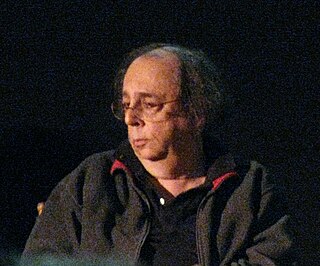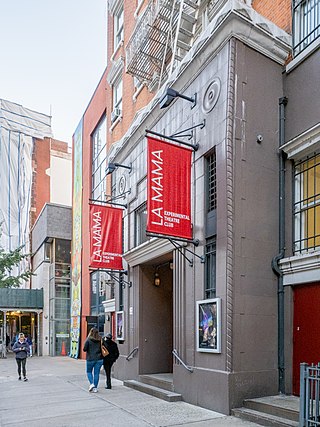
The performing arts are arts such as music, dance, and drama which are performed for an audience. They are different from the visual arts, which involve the use of paint, canvas or various materials to create physical or static art objects. Performing arts include a range of disciplines which are performed in front of a live audience, including theatre, music, and dance.

Richard Foreman is an American avant-garde playwright and the founder of the Ontological-Hysteric Theater.

Uncle Vanya is a play by the Russian playwright Anton Chekhov. It was first published in 1897, and first produced in 1899 by the Moscow Art Theatre, directed by Konstantin Stanislavski.

Shabnam Tolouei is an Iranian actress, theatre director and playwright. She is currently forbidden from working in Iran by the government because of her religion, the Baháʼí Faith, which is subject to state sanctioned persecution. Since December 2004 she is living in Paris, France. and became naturalized French citizen in 2019.
Big Art Group is a New York City-based experimental performance ensemble that uses language and media to push formal boundaries of theatre, film and visual arts to create culturally transgressive works. It has publicly declared its goal as the desire to develop innovative performances using original text, technology, and experimental methods of communication.

Austin Campbell Pendleton is an American actor, playwright, theatre director, and instructor.

William Orman Beeman is an American scholar whose specialty is the Middle East. He is Professor Emeritus of anthropology at the University of Minnesota, where he was Chair of the Department of Anthropology for 13 years until his retirement in 2020. He has authored many articles and fourteen books on Iranian politics, theatre, language, and culture.

Tadashi Suzuki is a Japanese avant-garde theatre director, writer, and philosopher.
Orghast was an experimental play based on the myth of Prometheus, written by Peter Brook and Ted Hughes, and performed in 1971 at the Festival of Arts of Shiraz-Persepolis, which was held annually from 1967 to 1977. It was performed in two parts, with the first performed at Persepolis around dusk, and the second at the nearby site of Naqsh-e Rostam at dawn.

Ta'zieh means comfort, condolence, or expression of grief. It comes from the roots aza which mean mourning. It commonly refers to passion plays about the Battle of Karbala and its prior and subsequent events. Sir Lewis Pelly began the preface of his book about Ta'ziyeh maintaining that "If the success of a drama is to be measured by the effects which it produces upon the people for whom it is composed, or upon the audiences before whom it is represented, no play has ever surpassed the tragedy known in the Mussulman world as that of Hasan and Husain." Years later Peter Chelkowski, professor of Iranian and Islamic studies at New York University, chose the same words for the beginning of his book Ta`ziyeh, Ritual and Drama in Iran.
Persian theater goes back to antiquity. The first initiation of theater and phenomena of acting can be traced in ceremonial theaters to glorify national heroes and legends and to humiliate the enemy, as in the classics "Soug Sivash" and "Mogh Koshi" (Megakhouni). Ancient Persian theatre and dance was significantly researched by the Greek historian Herodotus of Halikarnassos, who lived during the Persian rule in Greece. In his work Book IX (Calliope), he describes the history of Asian empires and also the Persian wars until 478 BC.

La MaMa Experimental Theatre Club is an Off-Off-Broadway theater founded in 1961 by African-American theatre director, producer, and fashion designer Ellen Stewart. Located in the East Village neighborhood of Manhattan in New York City, the theater began in the basement boutique where Stewart sold her fashion designs. Stewart turned the space into a theater at night, focusing on the work of young playwrights.
Mark Lamos is an American theatre and opera director, producer and actor. Under his direction, Hartford Stage won the 1989 Tony Award for Outstanding Regional Theatre and he has been nominated for two other Tonys. For more than 15 seasons, he has been artistic director of the Westport Country Playhouse. In May 2023, he announced he will leave the post in January 2024.

John Emigh is Professor Emeritus from the Departments of Theatre, Speech and Dance and of English at Brown University, Providence, Rhode Island. Emigh taught at Brown from 1967 to 2009. Since his retirement, he has mainly been teaching and directing in the Brown/Trinity Rep MFA program.

The Shiraz Festival of Arts was an annual international summer arts festival, held in Iran bringing about the encounter between the East and the West. It was held from 1967 to 1977 in the city of Shiraz and Persepolis in central Iran by the initiative of Shahbanu Farah Pahlavi.
Jean-Claude van Itallie was a Belgian-born American playwright, performer, and theatre workshop teacher. He is best known for his 1966 anti-Vietnam War play America Hurrah;The Serpent, an ensemble play he wrote with Joseph Chaikin's Open Theatre; his theatrical adaptation of the Tibetan Book of the Dead; and his translations of Anton Chekhov's plays.
Mohammad Aghebati is an Iranian theater director, scenic designer and actor. He has staged numerous dramas during his career, including Oedipus the King by Sophocles, AKA Jocasta; God’s Dead Words, Hamlet, The Prince of Grief by William Shakespeare, and Kiss You and Tears by Vaclav Havel.

Seyyed Mohammad Motamedi is an Iranian traditional vocalist, and a ney player.

Ivica Buljan is a Croatian theater director, playwright, theater critic, and educator whose work is widely known in Croatia and performed around the globe.

The Trinity/La MaMa Performing Arts Program is a fall semester study away program of Trinity College based at the La MaMa Experimental Theatre Club in New York City. The program is part of the Trinity College Office of Study Away, with students from various other liberal arts colleges enrolled in the program every year. Undergraduate students take classes and workshops that vary across all topics of interdisciplinary art, including acting, dance, performance art, puppetry, site-specific theatre, playwriting, directing, and media-based performance. Each student works at an internship/field study in an arts organization twice a week. Students also attend 3-4 shows a week in all disciplines of performance. Throughout the semester, students create and showcase original pieces, with a final performance presented at La MaMa Experimental Theatre Club and at Trinity College in Hartford, CT.














